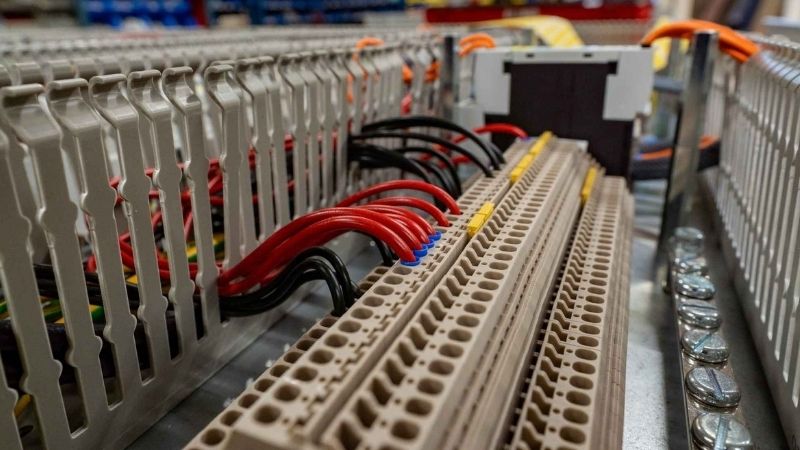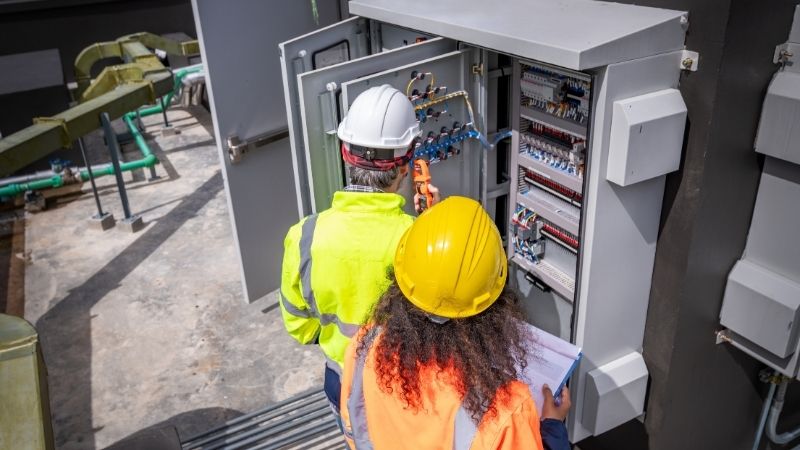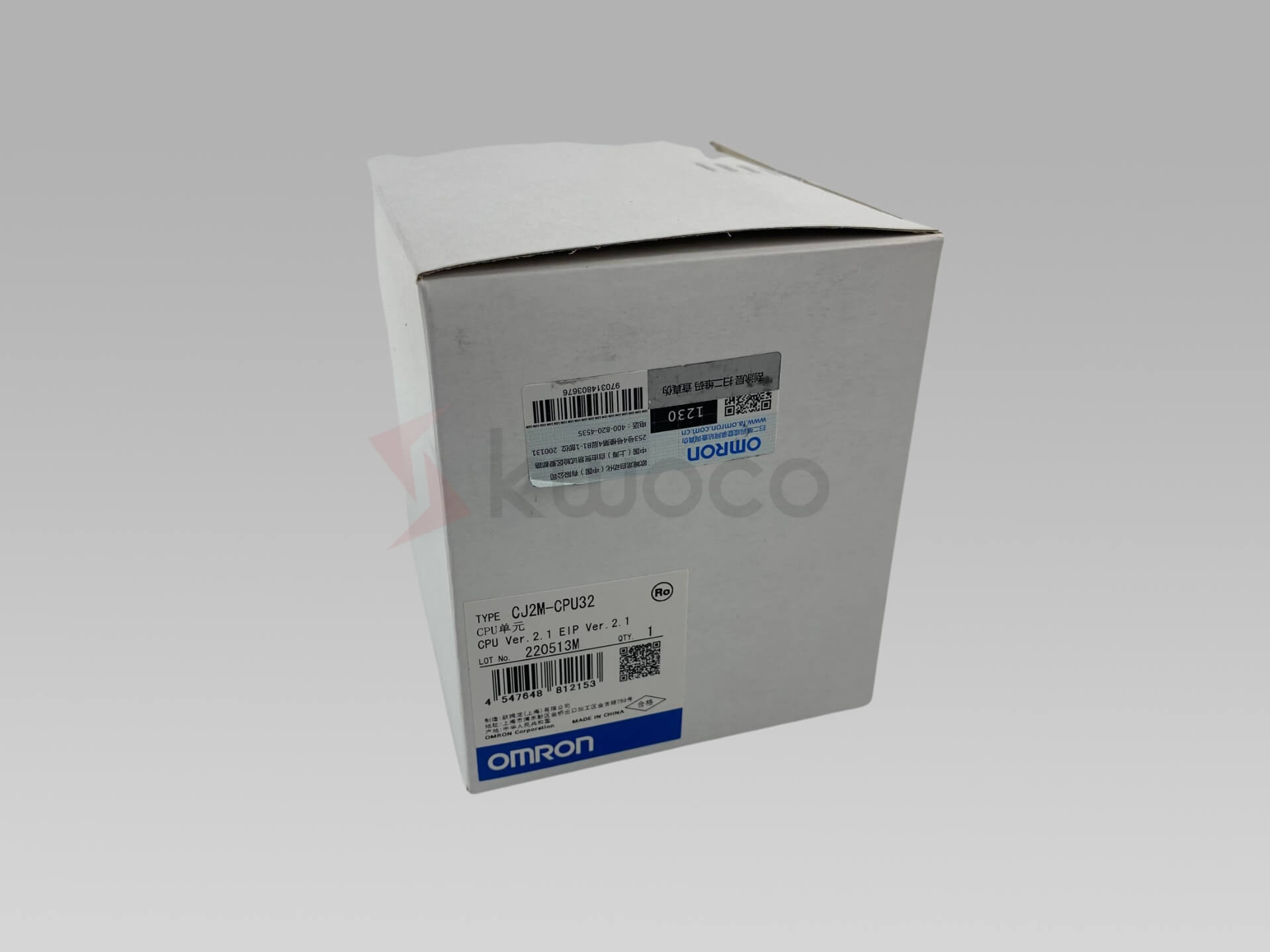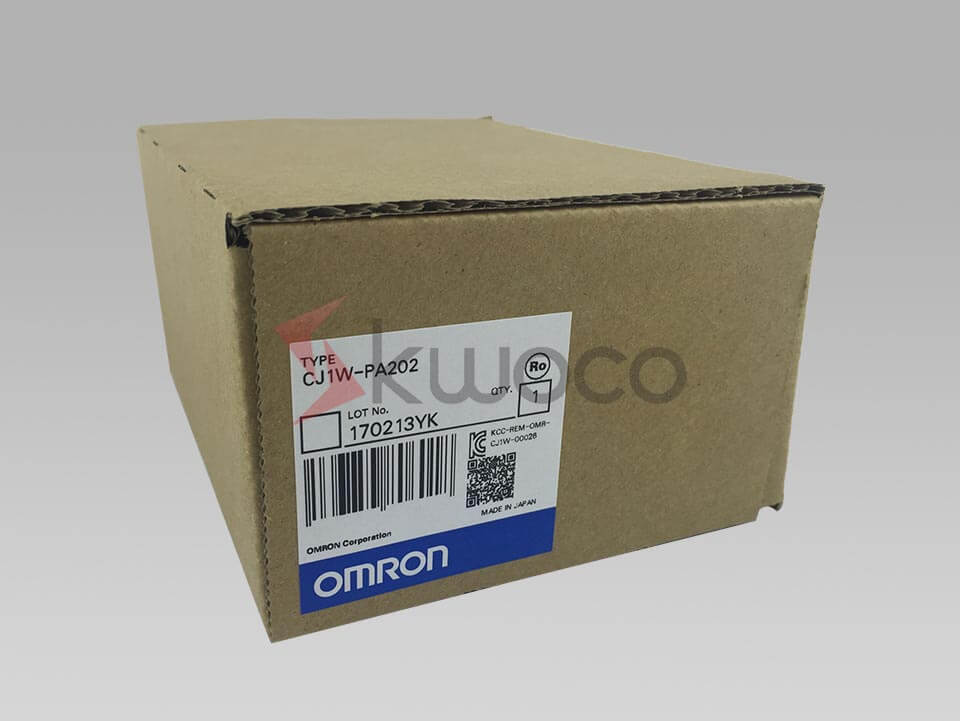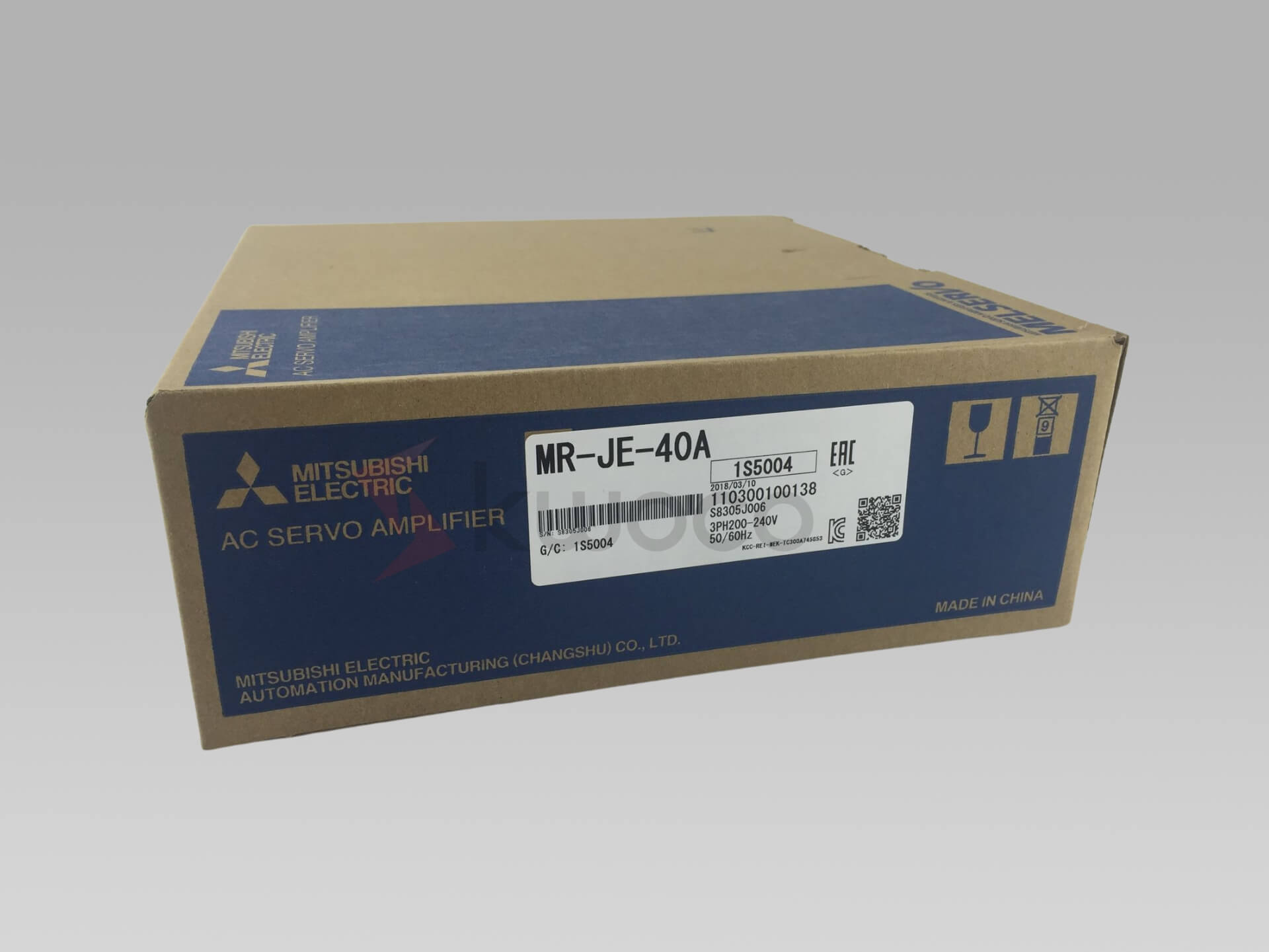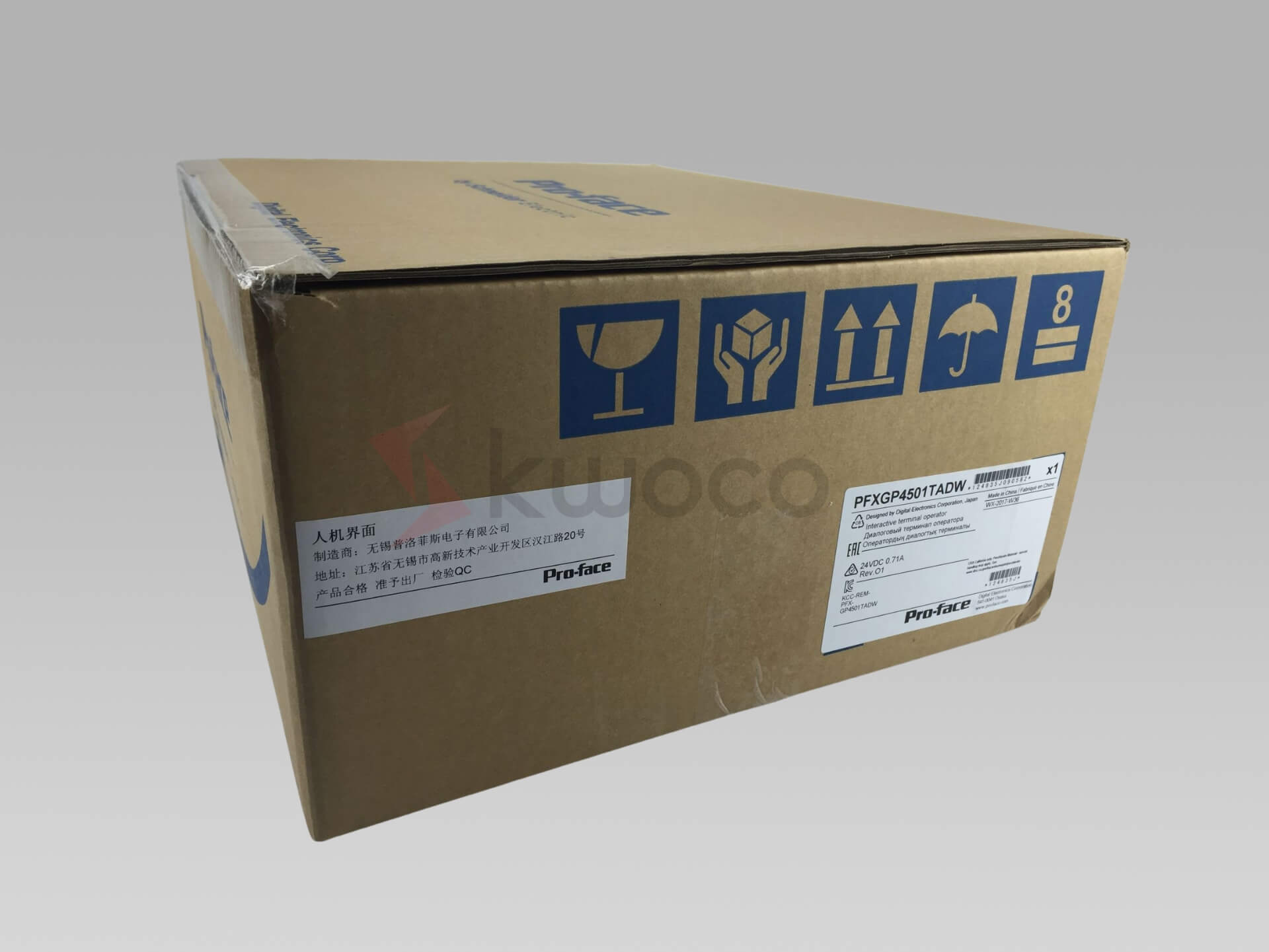24 V CC vs 120 V CA: comprendere le differenze nell'automazione
Che tu sia un ingegnere, un tecnico o un responsabile degli acquisti, questa guida è ricca di spunti utili per aiutarti a prendere questa importante decisione.
Sommario
Cos'è la tensione a 24 V CC e perché viene utilizzata nell'automazione?
La tensione a 24 V CC è ampiamente utilizzata nell'automazione perché è adatta per dispositivi a bassa potenza, inclusi sensori, relè e PLC. I circuiti di controllo a 24 V CC sono generalmente più sicuri di quelli a 120 V CA perché la tensione più bassa riduce il rischio di scosse elettriche. Nei pannelli di controllo e nei sistemi industriali, i 24 V CC sono spesso utilizzati nei solenoidi, sensorie cablaggio di controllo.
Questa potenza a bassa tensione assicura che i circuiti rimangano sicuri e affidabili e riduce al minimo il rischio di incendi elettrici. Per le applicazioni di automazione che richiedono un controllo preciso, 24 V CC offre il vantaggio di una potenza più stabile e di un amperaggio inferiore, il che è fondamentale per le apparecchiature sensibili.
Vantaggi principali:
- Sicurezza: Una tensione più bassa comporta un minor rischio di scosse elettriche o lesioni.
- Affidabilità:I sistemi a 24 V CC sono meno sensibili alle cadute di tensione o alle interferenze.
- Efficienza: I minori requisiti di corrente riducono il consumo energetico, rendendolo ideale per operazioni continue.
Quali sono i vantaggi della tensione a 120 V CA per i sistemi di controllo?
Sebbene 120 V CA sia spesso utilizzato in apparecchiature più grandi, è comune anche nei sistemi di controllo industriali. Tuttavia, 120 V CA è utilizzato principalmente per carichi e macchinari ad alta potenza. I circuiti di controllo sono solitamente alimentati a 24 V CC in molti sistemi industriali per migliorare la sicurezza, ridurre le cadute di tensione e garantire un funzionamento affidabile.
Uno dei motivi principali per cui 120 V CA è ampiamente utilizzato nei sistemi di controllo è la sua disponibilità e capacità di trasmettere potenza su lunghe distanze. Poiché tensioni più elevate richiedono meno corrente per trasmettere la stessa quantità di potenza, i sistemi 120 V CA possono essere più efficienti per determinate applicazioni.
Vantaggi principali:
- Potere superiore: Adatto a sistemi, apparecchiature o macchine più grandi che necessitano di più energia.
- Distanze più lunghe: : 120 V CA possono essere trasmessi su tratti di cavo più lunghi senza cadute di tensione significative.
- Conveniente: Più facile da implementare in aree in cui è prontamente disponibile la tensione a 120 V CA.
In che cosa differisce il controllo a 24 V CC dal controllo a 120 V CA?
Quando si confrontano 24 V CC e 120 V CA nei circuiti di controllo, le differenze principali risiedono nella sicurezza, nella complessità del cablaggio e nei tipi di apparecchiature supportate. Ad esempio, i circuiti di controllo a 24 V CC sono spesso più semplici e richiedono meno protezione, mentre i circuiti di controllo a 120 V CA potrebbero aver bisogno di componenti aggiuntivi come interruttori automatici, fusibili e sistemi di cablaggio più robusti.
I sistemi a 24 V CC sono generalmente più affidabili per applicazioni di controllo più piccole e sono ampiamente utilizzati in PLC e sensori a bassa potenza. D'altro canto, i sistemi di controllo a 120 V CA sono più appropriati per applicazioni in cui è necessaria una potenza maggiore, come motori e grandi attrezzature industriali.
Controllo 24VDC:
- Cablaggio semplificato.
- Ideale per dispositivi più piccoli e a basso consumo.
- Maggiore sicurezza con un rischio minimo di esposizione ad alta tensione.
Controllo 120VAC:
- Spesso utilizzato per macchinari ad alta potenza.
- Richiede maggiori misure di protezione e sicurezza.
- Supporta dispositivi più grandi e che consumano più energia.
24 V CC o 120 V CA: quale tensione dovresti usare?
Il confronto tra 24 V CC e 120 V CA dipende molto dalle esigenze di potenza e dall'applicazione. Per apparecchiature di automazione e circuiti di controllo più piccoli, 24 V CC è in genere l'opzione migliore. Tuttavia, 120 V CA è la scelta più adatta per macchinari più grandi e per la trasmissione di potenza su lunghe distanze, grazie alla sua capacità di trasportare amperaggi più elevati con una minore perdita di energia sulla distanza.
Al contrario, 120 V CA è più adatto per macchinari, motori o apparecchiature ad alta potenza in cui sono necessarie tensioni più elevate per prestazioni ottimali. Considerare i seguenti fattori quando si decide quale tensione utilizzare:
Fattori da considerare:
- Requisiti di potenza: Se il tuo sistema necessita di più potenza, 120 V CA potrebbe essere la scelta migliore.
- Sicurezza: Per i sistemi che richiedono una manutenzione frequente o coinvolgono operatori, la tensione a 24 V CC offre un'opzione più sicura.
- Distanza:Per i cablaggi su lunghe distanze, la tensione a 120 V CA è più efficiente, poiché riduce la corrente e riduce al minimo la caduta di tensione.
Come risolvere i problemi di tensione nei sistemi di automazione?
Quando si verificano problemi nei sistemi di automazione, la risoluzione dei problemi correlati alla tensione è spesso il primo passo. Problemi come caduta di tensione, alimentazione di tensione non corretta o guasti alle apparecchiature possono causare interruzioni significative nell'automazione industriale.
Problemi comuni di tensione:
- Caduta di tensione: Su lunghe distanze, la tensione può scendere, portando a un'erogazione di potenza inefficiente. Nei sistemi a 24 V CC, questo è particolarmente evidente nei circuiti di controllo, che sono sensibili anche a piccole cadute di tensione.
- Tensione errata: Assicurarsi che venga utilizzato il controllo 24VDC o l'alimentazione 120VAC corretti per l'applicazione specifica. L'utilizzo di una tensione errata può danneggiare componenti sensibili.
- Guasti delle apparecchiature: Possono verificarsi problemi con trasformatori, relè o PLC dovuti a incongruenze di tensione.
Suggerimenti per la risoluzione dei problemi:
- Controllare l'alimentazione: Assicurarsi che la fonte di alimentazione fornisca la tensione corretta per il sistema.
- Ispezionare il cablaggio: Esaminare il cablaggio di controllo per rilevare eventuali danni, corrosione o collegamenti impropri.
- Misurare la tensione: Utilizzare un multimetro per misurare la tensione effettiva nei punti di ingresso e di uscita del sistema per assicurarsi che rientri nell'intervallo previsto.
Domande frequenti
Qual è la differenza tra 24 V CC e 120 V CA nell'automazione industriale?
La tensione a 24 V CC viene utilizzata per applicazioni a bassa potenza come PLC e sensori, garantendo sicurezza ed efficienza energetica, mentre la tensione a 120 V CA è adatta per applicazioni ad alta potenza come motori e macchinari di grandi dimensioni.
La tensione a 24 V CC è più sicura di quella a 120 V CA?
Sì, la tensione a 24 V CC è considerata più sicura in quanto comporta un rischio minore di scosse elettriche rispetto alla tensione più elevata di 120 V CA.
Posso usare 120 V CA invece di 24 V CC per i circuiti di controllo?
Sebbene la tensione a 120 V CA possa essere utilizzata per i circuiti di controllo, è generalmente riservata alle applicazioni ad alta potenza. La tensione a 24 V CC è più adatta per i circuiti di controllo nell'automazione, grazie alla sua sicurezza e affidabilità.
Come posso risolvere i problemi di caduta di tensione in un sistema a 24 V CC?
Misurare la tensione in vari punti del sistema e verificare la presenza di connessioni allentate o cablaggi danneggiati. La caduta di tensione è più evidente su lunghe distanze, quindi assicurarsi che il cablaggio sia appropriato per la distanza.
Quale è più efficiente dal punto di vista energetico, 24 V CC o 120 V CA?
La tensione a 24 V CC è in genere più efficiente dal punto di vista energetico per i sistemi più piccoli, poiché richiede meno corrente ed è ideale per i dispositivi a bassa potenza. La tensione a 120 V CA è più efficiente per la trasmissione di energia su lunghe distanze.
Dai potenza ai tuoi progetti con i nuovi PLC originali Omron, Mitsubishi e Schneider, disponibili in magazzino e pronti da subito!
Conclusione
- 24 V CC è ideale per applicazioni a bassa potenza, garantendo sicurezza ed efficienza energetica nei circuiti di controllo.
- 120 V CA è più adatto per macchinari e attrezzature ad alta potenza, in particolare quando è necessaria la trasmissione di potenza a lunga distanza.
- La scelta tra 24 V CC e 120 V CA dipende dai requisiti di alimentazione, dai problemi di sicurezza e dall'efficienza richiesta per il sistema di automazione.
- Assicuratevi sempre di utilizzare la tensione corretta per la vostra apparecchiatura, per evitare danni o inefficienze.
Considerando questi fattori, puoi prendere una decisione più consapevole che garantisca l'affidabilità, la sicurezza e l'efficienza dei tuoi sistemi di automazione industriale.
Cerchi nuovi PLC originali per i tuoi progetti? Da Kwoco, abbiamo in magazzino gli ultimi PLC dei migliori marchi come Omron, Mitsubishi, E SchneiderAcquista con fiducia: spedizione veloce, qualità garantita! Acquista ora
Contattaci
Basta compilare il tuo nome, indirizzo email e una breve descrizione della tua richiesta in questo modulo. Ti contatteremo entro 24 ore.
Categoria di prodotto
Prodotti in saldo
Potresti trovare interessanti anche questi argomenti
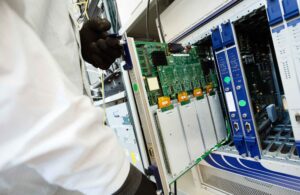
Posso usare un PC invece di un PLC?
Nel mondo in continua evoluzione dell'automazione industriale, spesso sorge una domanda urgente: posso usare un PC al posto di un PLC? Con i progressi della tecnologia, sia i PLC (Programmable Logic Controller) sia i PC (Personal Computer) sono diventati parte integrante del controllo dei processi industriali. Questo articolo esplora le principali differenze tra queste due opzioni di controllo, aiutandoti a decidere quale sia la più adatta al tuo sistema di automazione.
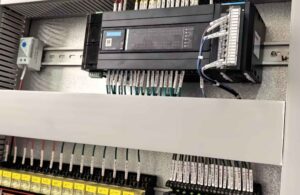
Sblocca la precisione: padroneggiare gli encoder e i contatori ad alta velocità con i PLC
Questo articolo si addentra nel mondo degli encoder e dei contatori ad alta velocità (HSC), spiegando come si interfacciano con i controllori logici programmabili (PLC) per fornire un controllo preciso nelle applicazioni di automazione industriale. Dalla comprensione degli encoder rotativi alla configurazione dei moduli HSC, esploreremo come queste tecnologie lavorano insieme per migliorare il controllo della velocità, la misurazione della posizione e l'efficienza complessiva del sistema.
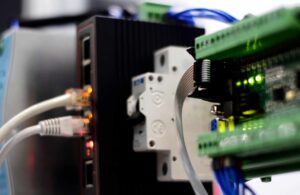
Che cosa è Ethernet? Perché utilizziamo Ethernet nei PLC?
Ethernet è diventata la spina dorsale delle moderne reti locali, offrendo un mezzo affidabile ed efficiente per la comunicazione dei dispositivi. Nel regno dell'automazione industriale, l'integrazione di Ethernet con i controllori logici programmabili (PLC) ha rivoluzionato il modo in cui le apparecchiature industriali comunicano, consentendo uno scambio di dati più rapido e processi di controllo migliorati.

